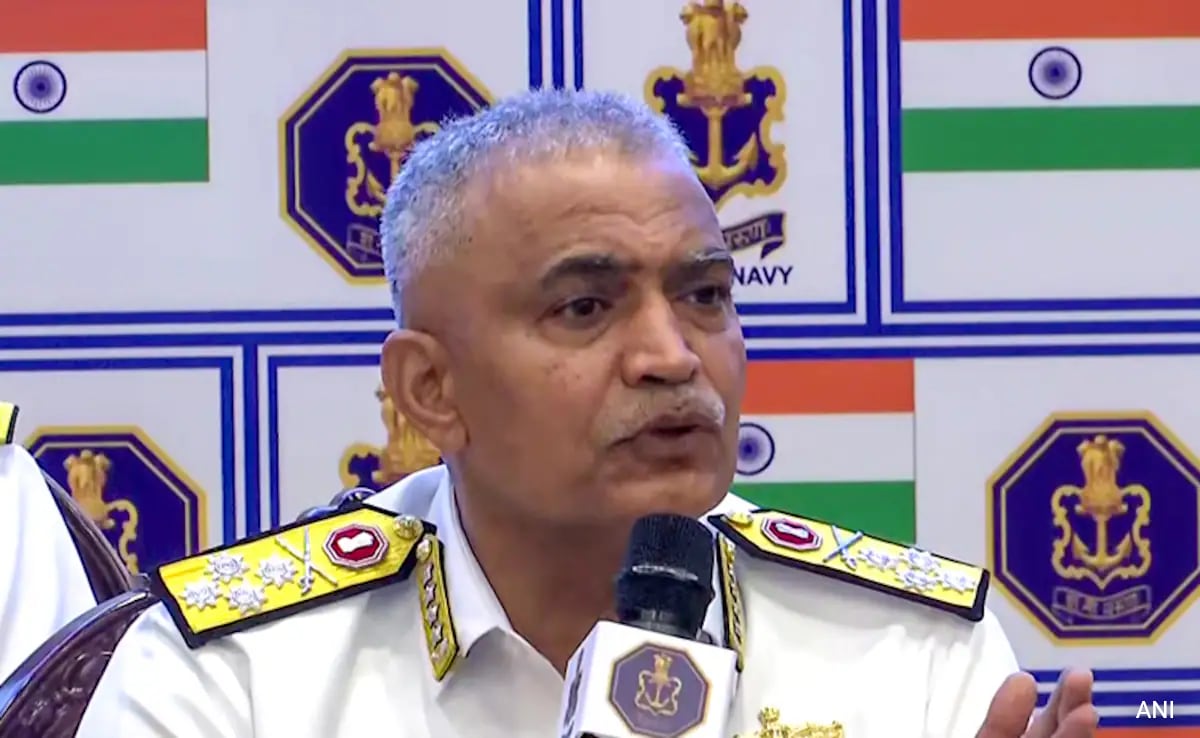
Indian Navy will take affirmative action to ensure a safer Indian Ocean Region, said navy chief
New Delhi:
Indian Navy will take “affirmative action” to ensure a safer and more secure Indian Ocean Region, its chief Admiral R Hari Kumar said on Saturday while citing the anti-piracy and other maritime security operations undertaken by the naval force in the last 100 days.
In response to a query during a press conference at the newly-built Nausena Bhawan here, the Chief of Naval Staff (CNS) said “no Indian-flagged vessel” has been targeted by the Houthis at sea.
“As you know, one MV Abdullah has been hijacked and taken to Somalia, so we are now keeping a close watch on it, whether it is going to be used as a pirate ship, or as a pirate mother ship. So, we are going to keep an even closer watch on ships operating in Somali waters,” Admiral Kumar said.
As part of maritime security operations, the Navy has undertaken anti-piracy, anti-missiles and anti-drones operations; 110 lives — 45 Indians and 65 foreign nationals — have been saved during ‘Op Sankalp’, according to a PPT presentation given by a Navy officer before the press conference.
It was also mentioned in the presentation that from November last year till March, “more than 90 maritime incidents have happened”, including 57 drone or missile attacks or sightings; and 39 incidents that include piracy, hijacking, or suspicious approaches.
Earlier in the day, INS Kolkata, carrying 35 pirates who were apprehended in a recent operation off the coast of Somalia, reached Mumbai, the Navy said.
These pirates were handed over to the Mumbai Police for further legal action under Indian laws, specifically the Maritime Anti-Piracy Act, 2022.
The Navy chief cited the dramatic mid-sea operation undertaken by the Navy along with the IAF that ended a three-month hijacking of a bulk carrier with the deployment of its warship INS Kolkata, long-endurance Sea Guardian drones, P-8I surveillance aircraft and airdropping of elite MARCOS commandos from a C-17 plane.
The Navy seized the former Maltese-flagged vessel, rescued 17 hostages and captured 35 armed pirates in the nearly 40-hour operation around 2,600 km from the Indian coast that experts say was the first such successful takeover of a cargo ship from the Somali pirates in the last around seven years.
In the last 10 years, this was the largest operation in which the Indian Navy caught 35 Somali pirates, the Navy chief said.
Admiral Kumar also said the Maritime Anti-Piracy Act, 2022, has been a “great enabler” for security forces, especially the Indian Navy, which is involved in anti-piracy operations.
Asked how the trial will take place for these Somali pirates brought to Mumbai, he said, “Earlier we never had any or act or any law. So, it was quite nebulous”.
In the Navy’s earlier operations, whenever pirates were captured, there were hardly any places where they could be taken to, for handing over, he said.
“We have this anti-piracy act which has been a great enabler for security forces, particularly for the Navy since we are involved in anti-piracy operations,” he added.
Earlier, a police station in Mumbai was nominated for this, now all coastal police stations have been empowered, Admiral Kumar said.
In 2011, the Navy had also captured pirates and brought them for trial in India.
“But, in the last 10 years or so, it is happening for the first time. Their modus operandi is that they will first capture a merchant ship and take it to Somalia, they will then stock it with more pirates, store food, water, fuel. They keep the crew on board, while they are negotiating for ransom, and then use this ship as a ‘mother ship’ to come out and do piracy attacks on other vessels which transit through that area,” Admiral Kumar said.
He had recently said the Navy has got a shot in the arm because of this legislation and underlined the deployment to counter piracy attempts.
“Very few countries have an act like this. This has empowered us to visit, board, search and seize any suspicious vessel, craft, fishing boat, dhow, we board, we inspect and if we find any piracy triggers, we take action. In the last 100 days, we must have done more than 1,000 boardings. Boarding a vessel takes on average 5-6 hours to board and inspect it thoroughly,” he said.
On Houthis rebels in Yemen, he said, they have been targeting vessels with ballistic missiles, shore-to-ship missiles, and drones. They have been using drones for surveillance as well, he said.
The Navy chief also said that 100 days of sustained ‘Op Sankalp’ has also broken the myth of short and swift operations.
Asked if India’s growing prowess in seas has elevated the image of the Indian Navy as the first responder, Admiral Kumar said, “Bharat is on the trajectory to becoming a great power.” “With great power comes great responsibility,” he said while asserting that the “Indian Navy is determined to protect, preserve, promote and pursue our national interests in the maritime domain”.
Asked how long these operations will continue, he replied, till the Indian Ocean is safe and secure. “The Indian Navy will take affirmative action to ensure a safer, more secure Indian Ocean Region.” So, whether it is Indian nationals or vessels, “we will ensure their protection”, the Navy chief said.
“We are the largest resident naval power in the Indian Ocean. Indian Navy’s responsibility is to ensure the Indian Ocean Region remains safe, secure, and stable and we will ensure that it is free, open, inclusive, and rules-based order is maintained,” he added.
In his opening address, he also asserted that the new Nausena Bhawan is “not just a building but a symbol of ‘Naya Bharat’ and ‘Nayi Nausena’ and the progress of both our nation and the Navy”.
(Except for the headline, this story has not been edited by NDTV staff and is published from a syndicated feed.)

